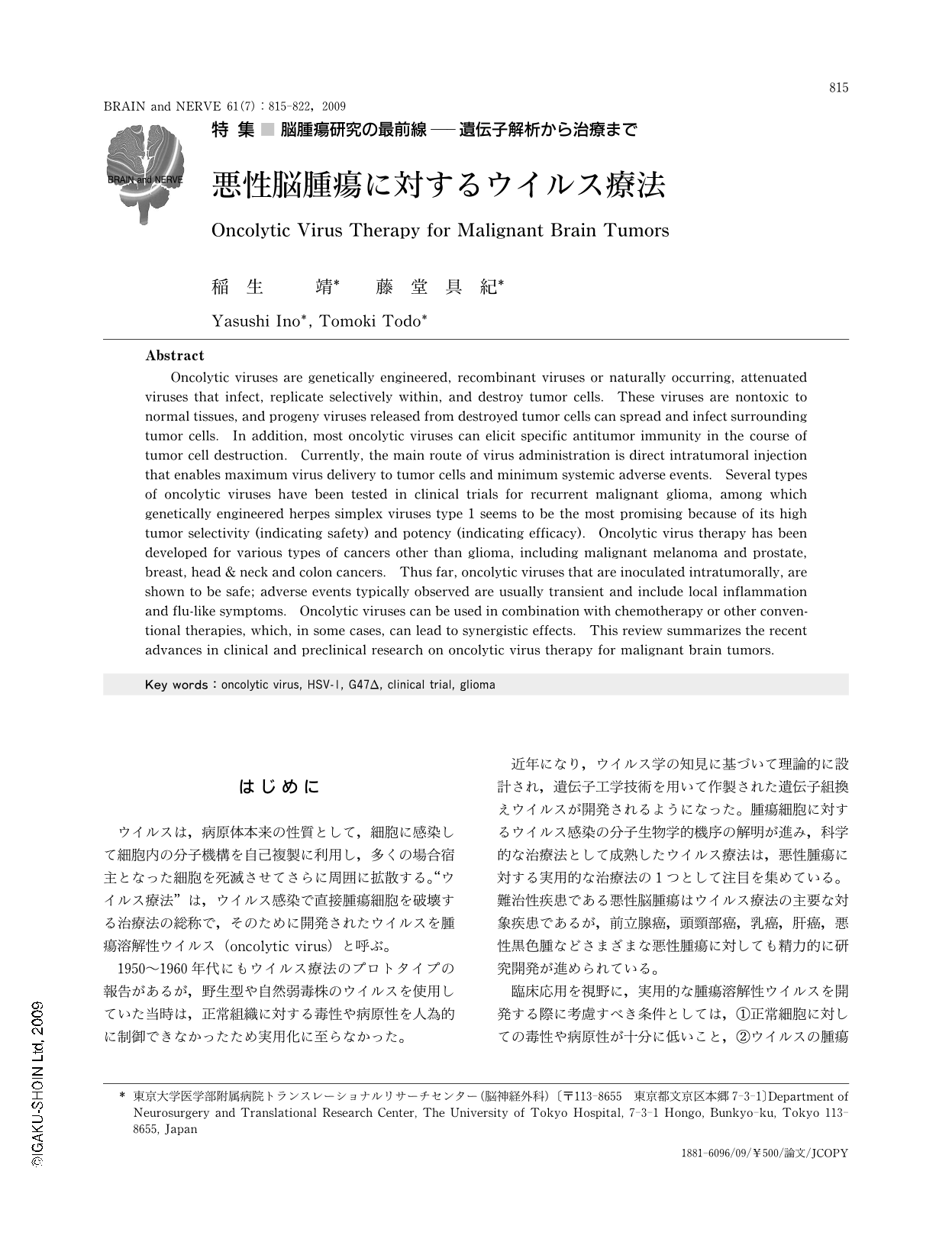Japanese
English
- 有料閲覧
- Abstract 文献概要
- 1ページ目 Look Inside
- 参考文献 Reference
はじめに
ウイルスは,病原体本来の性質として,細胞に感染して細胞内の分子機構を自己複製に利用し,多くの場合宿主となった細胞を死滅させてさらに周囲に拡散する。“ウイルス療法”は,ウイルス感染で直接腫瘍細胞を破壊する治療法の総称で,そのために開発されたウイルスを腫瘍溶解性ウイルス(oncolytic virus)と呼ぶ。
1950~1960年代にもウイルス療法のプロトタイプの報告があるが,野生型や自然弱毒株のウイルスを使用していた当時は,正常組織に対する毒性や病原性を人為的に制御できなかったため実用化に至らなかった。
近年になり,ウイルス学の知見に基づいて理論的に設計され,遺伝子工学技術を用いて作製された遺伝子組換えウイルスが開発されるようになった。腫瘍細胞に対するウイルス感染の分子生物学的機序の解明が進み,科学的な治療法として成熟したウイルス療法は,悪性腫瘍に対する実用的な治療法の1つとして注目を集めている。難治性疾患である悪性脳腫瘍はウイルス療法の主要な対象疾患であるが,前立腺癌,頭頸部癌,乳癌,肝癌,悪性黒色腫などさまざまな悪性腫瘍に対しても精力的に研究開発が進められている。
臨床応用を視野に,実用的な腫瘍溶解性ウイルスを開発する際に考慮すべき条件としては,①正常細胞に対しての毒性や病原性が十分に低いこと,②ウイルスの腫瘍選択性に関して科学的根拠があること,③野生型への復元,自然変異や組換えが起きにくく,ウイルスゲノムが安定であること,④抗ウイルス薬や抗血清でウイルス療法が中断できること,⑤大衆への感染や環境汚染の可能性が低いことなどが安全性の面で挙げられる。さらに,⑥腫瘍細胞に対する感染効率や腫瘍内での複製能が高く,殺細胞効果が強いこと,⑦ウイルス中和抗体の影響が軽微であること,⑧宿主免疫が抗腫瘍作用に有利に働くことが効果の面で重要である。加えて,製品化のためには,⑨力価の高いウイルスの量産が技術面およびコスト面から可能であること,⑩製剤として安定で長期間の保存が可能であることなども必要である。
正常細胞に対する毒性を抑える手段として,腫瘍細胞で活性化あるいは低下している酵素,シグナル伝達経路,転写因子,表面レセプターなどをウイルス複製の分子機構と巧みに組み合わせて腫瘍溶解性ウイルスが開発されている。目的に合わせて設計された遺伝子組換えウイルス以外にも,ヒトのウイルスの自然弱毒株やワクチン株や,元来はヒトを宿主とせず病原性を持たないが腫瘍細胞では細胞障害性を現すようなウイルスも使用されている。
悪性グリオーマを対象としてウイルス療法の臨床試験が行われ,結果が論文発表されているウイルスには,単純ヘルペスウイルスのG2071,2)やHSV17163-5),アデノウイルス6),レオウイルス(reovirus:RV)7),ニューカッスル病ウイルス(newcastle disease virus:NDV)7)などがあり,麻疹ウイルスも臨床試験が進行中である(Table)。本稿では単純ヘルペスウイルスを中心に,悪性グリオーマのウイルス療法について概説する。
Abstract
Oncolytic viruses are genetically engineered,recombinant viruses or naturally occurring,attenuated viruses that infect,replicate selectively within,and destroy tumor cells. These viruses are nontoxic to normal tissues,and progeny viruses released from destroyed tumor cells can spread and infect surrounding tumor cells. In addition,most oncolytic viruses can elicit specific antitumor immunity in the course of tumor cell destruction. Currently,the main route of virus administration is direct intratumoral injection that enables maximum virus delivery to tumor cells and minimum systemic adverse events. Several types of oncolytic viruses have been tested in clinical trials for recurrent malignant glioma,among which genetically engineered herpes simplex viruses type 1 seems to be the most promising because of its high tumor selectivity (indicating safety) and potency (indicating efficacy). Oncolytic virus therapy has been developed for various types of cancers other than glioma,including malignant melanoma and prostate,breast,head & neck and colon cancers. Thus far,oncolytic viruses that are inoculated intratumorally,are shown to be safe; adverse events typically observed are usually transient and include local inflammation and flu-like symptoms. Oncolytic viruses can be used in combination with chemotherapy or other conventional therapies,which,in some cases,can lead to synergistic effects. This review summarizes the recent advances in clinical and preclinical research on oncolytic virus therapy for malignant brain tumors.

Copyright © 2009, Igaku-Shoin Ltd. All rights reserved.


